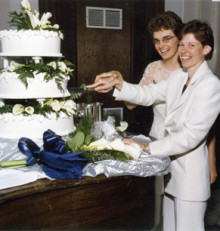The Supreme Court’s decision that Section 3 of the Defense of Marriage Act (DOMA) is unconstitutional opens the door for military members and their same-sex spouses to get all the same benefits as heterosexuals who are married, regardless of where the couple lives as long as the marriage took place in a state that recognizes gay marriage.
THAT IS NOT THE CASE FOR VETERANS. VA regulations specify that the marriage to a veteran must be valid. To determine validity, the VA considers:
- The law of the state where the couple resides;
- Where they resided at the time of the marriage; or
- Where they resided when the right to VA benefits arose.
The District of Columbia and ten states that sanctify same-sex marriages include: Connecticut, Iowa, Maine, Maryland, Massachusetts, Minnesota, New Hampshire, New York, Vermont and Washington. Delaware will allow them beginning July 1st and Minnesota will on August 1st. Because of the Supreme Court’s decision not to hear California’s Proposition 8 case, California gay residents can again get married. (We need some “warm” states to adopt same-sex marriage!).
Scenario One: I live in Georgia where gay marriage is not recognized and we have a state constitutional amendment specifically prohibiting it. Based on the three ways listed above as to how the VA determines a valid marriage, if I were to go to New York or any of the other states that permit gay marriage, my spouse and I would still not receive any additional veterans benefits due to our status as being married. It would not be recognized by the VA.
However, there is hope to get benefits under provision number three, “where they resided when the right to VA benefits arose” IF we later move to a state that recognizes gay marriage and then the right to VA benefits arose (i.e. I become elderly and in need of wartime pension with Aid and Attendance). The question is, does the VA get to choose which of the three options of validity apply or is it that if you meet any of the three the marriage is valid?
Scenario Two: A same-sex couple lives in Maine and gets married in Maine. They later move to Texas. Maine allows gay marriage. Thus, when the veteran or the surviving spouse, who now live in Texas, need VA benefits, either of them should be able to receive it in Texas, even though Texas does not recognize same-sex marriage.
The VA laws do specifically state that marriage is between a man and a woman, in accordance with DOMA. But, since this provision of DOMA has been deemed unconstitutional, it follows that this provision in the VA law must be unconstitutional and will need to be repealed.
The discriminatory disparity between current military members being able to get married, regardless of where they live, and still get all marriage equality rights; whereas, veterans are not able to do the same is an issue of equality sure to be litigated. Moreover, the fact that some veterans will get benefits just because they lived in the right state at the right time and others won’t because they lived in the wrong state at the wrong time, violates both the Equal Protection Clause and the Due Process Clause of the United States Constitution, and will certainly be litigated.
While the unconstitutionality of Section 3 of DOMA was a huge win for equality for gays, specifically for current military members, the victory and benefits of its repeal do not extend to all same sex couples equally. It is only a beginning of change and more is certain to come over the next few years. This will create the need for more and more attorneys to be aware of the changes and how they can best advise their clients with regard to benefits available to them.
If you are not currently an LWP member, and have considered – or are interested in discovering what we offer for asset protection, Medicaid & VA click here for information on our two day summit in Phoenix, AZ.
Victoria L. Collier, Certified Elder Law Attorney, Fellow of the National Academy of Elder Law Attorneys, Co-Founder, Lawyers with Purpose, LLC, Veteran of the U.S.A.F. and author of 47 Secret Veterans’ Benefits for Seniors…Benefits You Have Earned but Don’t Know About.




Add a Comment